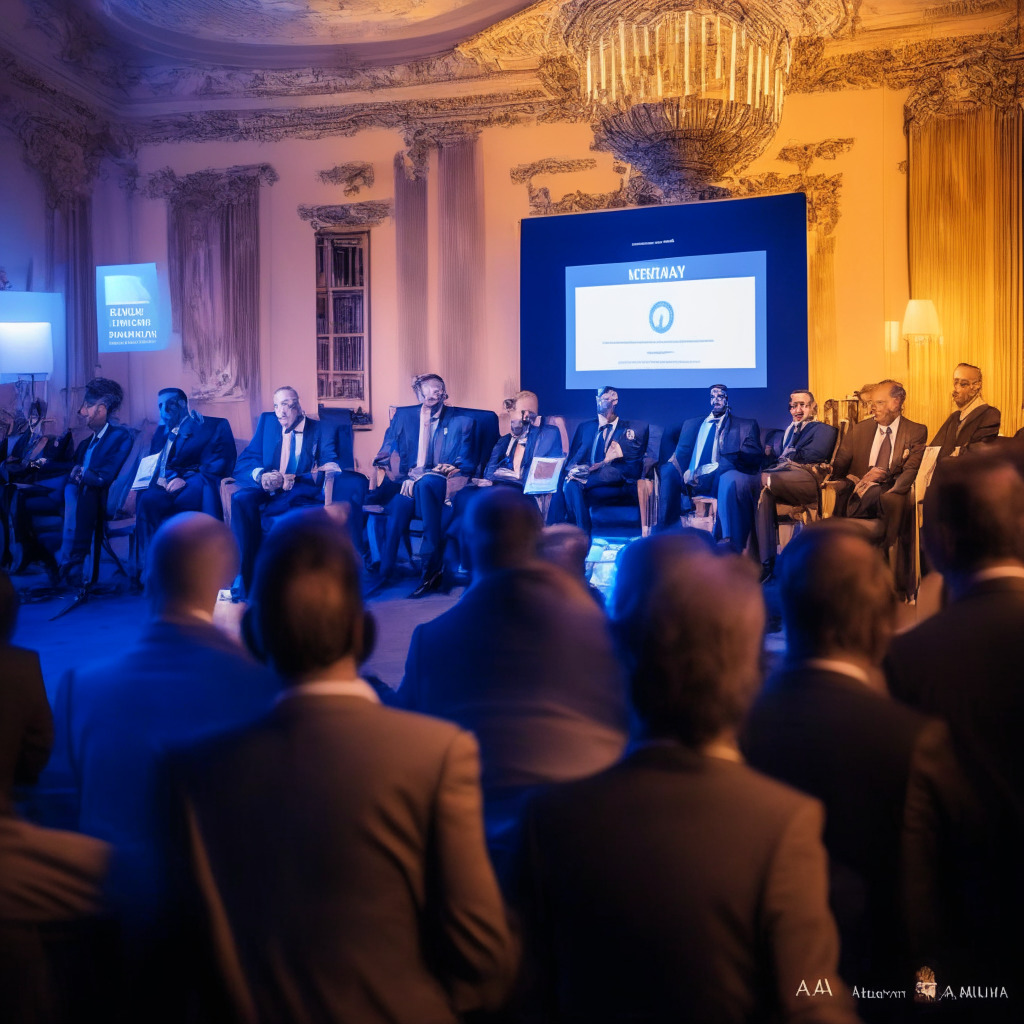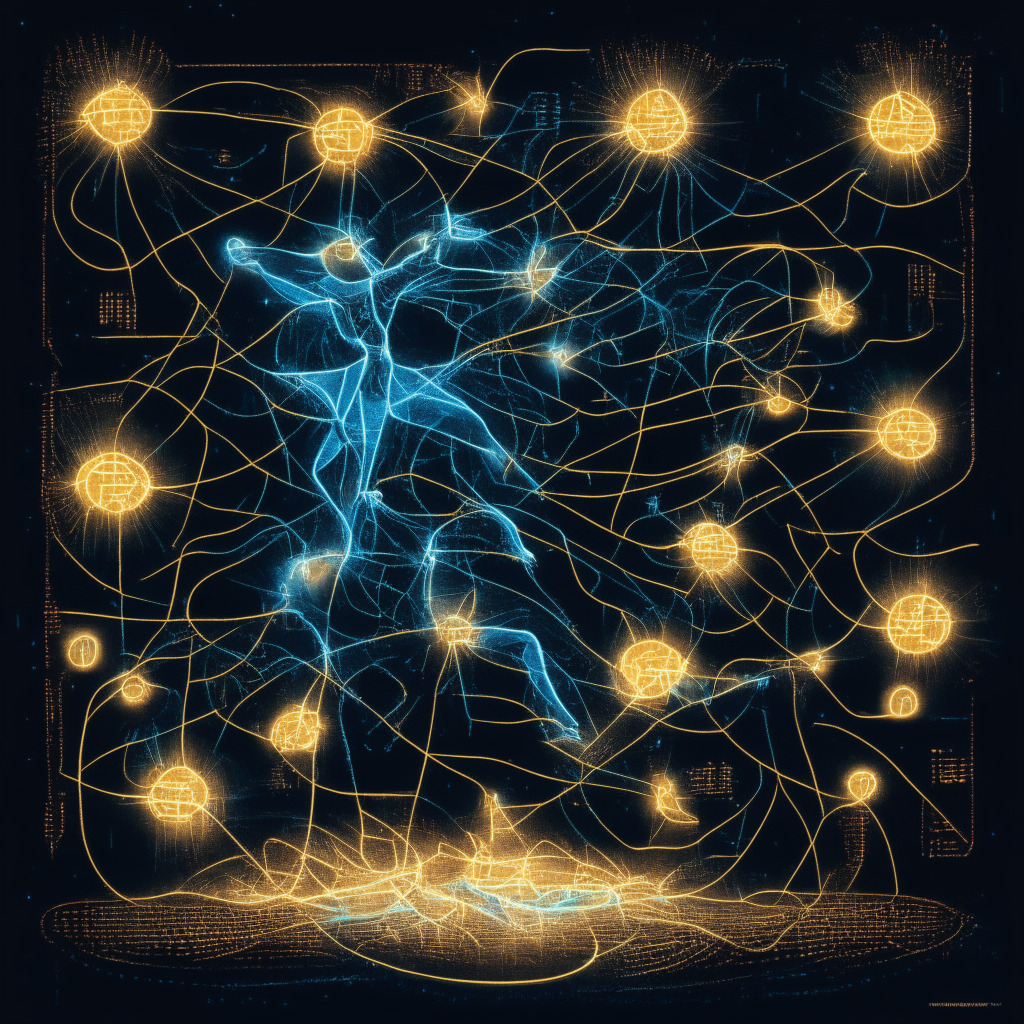Microsoft President Brad Smith urges governments to regulate AI technology, addressing emerging concerns and uniting public and private sectors. He suggests licensing AI developers and holding companies accountable for managing disruptive technology, stressing the importance of balancing AI capabilities with mitigating potential risks.
Search Results for: OpenAI CEO
Raising $115M for New Anti-Bot Tech and UBI: Worldcoin’s Bold Vision Faces Privacy Concerns
Tools for Humanity has raised $115 million in series C funding for projects including an alternative to the CAPTCHA test and the Worldcoin project. The company aims to create efficient bot detection methods while addressing concerns over privacy in their “Proof of Personhood” retina scan verification process.
Apple & Samsung’s ChatGPT Concerns: AI Benefits vs. Confidentiality Risks in Major Companies
Apple and Samsung join other organizations like JPMorgan Chase and Amazon in restricting employee use of AI platforms such as OpenAI’s ChatGPT due to concerns over potential leaks of confidential information. OpenAI is responding to these concerns by improving ChatGPT’s privacy controls and encouraging federal regulation.
Axie Infinity App Store Debut, NFT Trends, and AI Regulation: Debating Blockchain’s Future
This week’s blockchain news covers Axie Infinity’s App Store launch and a fluctuating NFT trading volume, highlighting the triumphs and challenges in this growing ecosystem. As crypto projects make headlines, staying informed on developments is essential for enthusiasts, traders, and investors.
Crypto Market Unfazed by Debt Ceiling, Stablecoins Diversify, and SEC’s Ripple Case Unveils Secrets
As the U.S. debt ceiling discussions continue, stablecoin issuers like Tether and Circle diversify their reserves amid dollar risks. Meanwhile, a federal judge ruled the SEC cannot seal documents related to ex-official William Hinman’s 2018 crypto speech, potentially revealing the reasoning behind ether not being considered a security.
Banking Crisis Fears Boost Crypto Markets: Balancing Innovation and Financial Security
Amid the potential US regional banking crisis, the uncertainty in the banking sector has proven to be bullish for Bitcoin prices. The rise of cryptocurrencies and decentralized finance offers potential solutions to traditional banking challenges during times of economic uncertainty while also prompting concerns and striking a balance between innovation and security.
ChatGPT’s Italian Re-Entrance: Triumph over Privacy Concerns or Prelude to Stricter AI Regulations?
ChatGPT, the popular AI chatbot, has once again been granted permission to operate in Italy […]
Balancing Innovation and Regulation: The Cryptocurrency Dilemma in Government Oversight
“Sam Altman, leader of Worldcoin and OpenAI, discussed his concern about US government’s aggressive regulation of the cryptocurrency industry. While accepting the need for regulatory oversight, he criticized the government’s stern approach, arguing it stifles the potential of digital assets particularly Bitcoin (BTC), and highlighted the surveillance risks of Central Bank Digital Currencies (CBDCs).”
LinkedIn’s AI-Assistants Join the Recruitment Game: Revolutionary or Risky?
LinkedIn is incorporating AI into its operations to help recruiters and learners, despite skepticism about loss of human touch in such processes. Advocates argue that AI provides time-saving benefits and tailors content, with 74% LinkedIn users noting time savings after the introduction of AI-assisted messages when recruiting. The ongoing debate about AI’s pros and cons continues, but its growing incorporation into various industries is undeniable.
Zuckerberg’s Bet on AI for Meta’s Metaverse Dominance: Visionary Leap or Blind Hope?
Meta’s CEO, Mark Zuckerberg, highlighted the crucial role of AI in the development of the metaverse during a recent interview. By leveraging technology that integrates VR/AR and AI, Zuckerberg aims to establish Meta’s dominance in the 3D immersive metaverse. Despite financial setbacks, he remains committed to the metaverse vision, betting on Llama 2’s technology integration with Meta AI as their unique competitive edge.
Navigating the Surge in AI: Evaluating Business Intelligence Platform AlphaSense
AlphaSense, an AI platform focused on business intelligence and search, has raised its valuation from $1.7 billion to $2.5 billion. The firm offers insights-as-a-service, delivering perceptive business and finance analytics, with its tailored approach promising more specific insights in the crypto and blockchain world. Despite the high-risk, high reward nature of the AI sector, AlphaSense plans to strategically position itself in the B2B generative AI sector.
Ernst & Young’s Hefty $1.4 Billion Investment in AI: Boon or Risk for the Future of Technology?
“EY has invested $1.4 billion in AI technologies, targeting the development and launch of the EY.ai platform to aid organizations in adopting AI. The architecture is rooted in EY’s large language model, and gains extra potential through a partnership with Microsoft. The investment is also geared towards integrating AI into existing EY services.”
Decoding the AI Regulation Puzzle: Tech Titans Vs. Lawmakers on Navigating AI’s Future
“In a closed-door meeting, tech leaders including Elon Musk and Mark Zuckerberg stressed the urgent need for AI regulation. The discussions revolved around AI’s potential dangers and benefits, with skepticism about unregulated technology’s negative impact, yet belief in AI’s groundbreaking potential with careful monitoring.”
Google’s AI Policy Update: A Step Towards Transparency or an Ethical Minefield?
Google’s recent policy update mandates disclosure of AI-generated content in political ads, aiming to increase transparency and ethics in AI. The policy will apply to image, audio, and video content from mid-November 2023 onwards. However, this doesn’t solve all AI ethics issues, especially given the rise of Deepfakes.
Navigating the Uncertain Waters of AI Progress and Blockchain Fluctuations
“Baidu, China’s tech powerhouse, has released over 70 AI models with over 1 billion parameters each. Recent models show up to a 50% improvement in efficiency. However, the rapid expansion of AI technology raises concerns about misuse and privacy.”
South Korea’s AI Revolution: Naver Corp’s CLOVA X and the Balancing Act of AI Ethics
“The tech giant Naver Corp has launched CLOVA X, a state-of-the-art generative AI chatbot for Korean-language users. Built using supercomputing, data analysis capabilities and expertise in Korean language, CLOVA X hold conversations, summarize texts and generate stories, comparable to globally acclaimed AI systems.”
Nvidia’s Success Stirs AI-Crypto Market: A Sustainable Surge or a Risky Ride?
“In the global transition from general-purpose computing to AI, several AI-related cryptocurrencies have significantly uplifted, driven by tech giant Nvidia’s exceeded Q2 earnings predictions. Worldwide companies are racing to adopt generative AI, indirectly boosting AI-related cryptos. However, despite potential, the volatile crypto market necessitates investor caution and understanding.”
Unveiling AI’s Role in the Future of Content Moderation: An Examination of Potential and Pitfalls
“Artificial Intelligence, like OpenAI’s GPT-4, presents potential for streamlined content moderation, offering faster turnover times and improved consistency. However, challenges like prediction accuracy, understanding complex human dynamics, and privacy considerations need addressing for successful AI integration in our digital society.”
Anthropic Secures $100M Investment from SK Telecom: Assessing the Future of AI in Telecom Industry
“AI developer Anthropic secured a $100 million investment from South Korean corporation, SK Telecom, to create a multilingual large language model for the Telco AI platform. This move represents SK Telecom’s aspirations to revolutionize the telecom industry leveraging AI technology.”
Aptos Labs and Microsoft Collaborate to Explore AI and Blockchain Synergy: Pros, Cons, and Complications
“Aptos Labs, a layer 1 blockchain initiated by ex-Facebook employees, plans to utilize Microsoft’s Artificial Intelligence to enhance its utilities, including the launch of an AI chatbot, Aptos Assistant. This move aims to democratize blockchain usage in the evolving Web3 world.”
Regulatory Hurdles and Cryptographic Breakthroughs: A Dive Into the World of Digital Currency
The global payment powerhouse, PayPal, has introduced its Ethereum-based stablecoin, PYUSD, stirring up the digital currency landscape. Simultaneously, cryptographic activities like Sam Altman’s Worldcoin faces regulatory challenges in Kenya. Meanwhile, Curve Finance showcases resilience by recovering 73% of funds stolen in a recent hack. Despite occasional regulatory complexities, these developments affirm the dynamic growth in the cryptographic domain.
Worldcoin’s Kenyan Controversy: Privacy versus Blockchain Innovation in Crypto Tech
“The recent police raid on Worldcoin’s Nairobi warehouse, in pursuit of collected data, has stirred controversy in Kenya. Concerns have been raised about potential privacy violations and misuse of sensitive iris data by Worldcoin’s project. This episode highlights how emerging crypto technologies are reshaping the discourse around privacy.”
Worldcoin’s Iris-Scanning Identity Project: Breakthrough Innovation or Data Privacy Nightmare?
“Worldcoin, a digital ID crypto project, introduces a digital identity system based on iris scanning to differentiate humans from AI entities. Despite concerns about data privacy, it has secured $115 million funding and over 2 million sign-ups. However, industry experts question Worldcoin’s ability to manage personal information securely.”
Navigating the Regulatory Crossroads: Cryptocurrencies, AI and SEC’s Gary Gensler’s Stance
“Gensler, the head of SEC, believes AI’s transformative potential warrants greater focus despite concerns about crypto market fraud. He emphasizes on AI’s significant risks including automating responsibilities and potential ‘cascading implications’ on assets within his jurisdiction. However, AI also offers opportunities in financial market, like providing investment advice.”
Unpredictable Dance: Blockchain’s Global Developments and Regulatory Twists
These developments underscore an exciting time for blockchain technologies, highlighting the intricate dance between regulators and innovators. They illustrate the challenges that emerge in a rapidly evolving digital ecosystem. However, the future scope for blockchain seems expansive and unpredictable.
Unmasking the Court Chess: Legal Intricacies and Revelations in Blockchain and Crypto
“In the volatile world of digital currencies, former FTX CEO, Sam Bankman-Fried recently made headlines with his legal team’s request to seal privileged documents. This legal maneuver, where transparency clashes with privacy rights, could influence his $250-million bail application and carries implications for both personal privacy and broader market dynamics. Meanwhile, French data protection agency CNIL questions Worldcoin’s data collection, signaling privacy concerns in an increasingly blockchain and crypto-driven world.”
The Worldcoin Enigma: A Revolution in Identity Protocol or a Privacy Nightmare?
Worldcoin, an innovative platform created by Sam Altman, promises to make cryptographic currencies more dispersed than Bitcoin. Boasting a unique identity protocol using iris scans and AI, it aims to onboard billions of users into crypto markets. However, concerns about privacy, tokenomics, and regulatory challenges have arisen, prompting questions about the future of such revolutionary blockchain projects.
Worldcoin Token Launch: Exciting Exchange Phenomenon or Potential Market Pitfall?
The Worldcoin token, launched by OpenAI creator Sam Altman, raised market concerns due to its tokenomics. Trading volume exceeded its capitalization by 1.6 times in just 24 hours, attributed to the project loaning massive numbers of tokens to market makers. Additionally, 40% of these tokens will be unlocked between 2024 and 2025, raising concerns about price stagnation and depreciation for potential investors, alongside possibly counterintuitive Bitcoin trends.
Worldcoin’s Future: Privacy Concerns, Dubious Investors and Potentially Revolutionary Tech
The Worldcoin project, co-founded by OpenAI’s Sam Altman, uses a hardware unit called the Orb for identity verification by iris scanning. Despite initial success, criticism has piled up around privacy, centralization, security concerns, and questionable marketing strategies. Ethereum co-founder, Vitalik Buterin and crypto influencer ZachXBT have voiced concerns about potential misuse and exploitation.
Worldcoin: The Hybrid of Blockchain and Biometrics Faces Upcoming Regulatory Scrutiny
UK’s data regulator intends to probe into OpenAI’s cryptocurrency initiative, Worldcoin, which merges blockchain with biometric identification. Amid its success, concerns surface over privacy and the robustness of its identity verification system. The project, which reaches a milestone of two million sign-ups, faces inevitable comprehensive investigations by regulators worldwide.
The Crypto Rollercoaster: Market Fluctuations, Emerging Cryptos, and Retina Scans in Play
The cryptocurrency market is currently experiencing a minor descent, anticipating the Federal Reserve’s interest rate announcement. Sam Altman’s new Worldcoin employs retina scans to counteract AI-developed synthetic identities. Despite the market’s decline, Flex Coin, Evil Pepe Coin, ApeCoin, Burn Kenny, and The Graph highlight their strong potential due to robust fundamentals and positive technical analysis.
A Rough Patch in the Crypto Realm: The Dip in VC Funding for Web3 Startups and the Rising Hope
Crunchbase reports indicate a 76% drop in funding for Web3 startups from VC funds in Q2 compared to last year. This year’s tally stands at $3.6 billion, a 78% downturn from 2022’s $16 billion. Despite this drop, AI startups continue to attract investors, while certain Web3 initiatives manage to secure impressive funding amidst the downturn.































